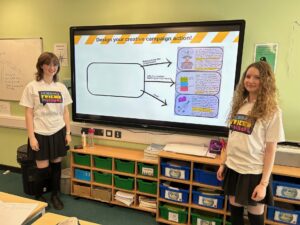Foundational Literacy and Numeracy: What is it, and why is it so important?
Every child has the right to education, and any future learning is dependent on the ability to read, write, do basic maths, and develop social emotional learning skills, like building relationships. These skills are referred to as foundational learning, because they form the foundations for all subjects and advanced skills that a student will encounter as they progress through their schooling.

Students at Bishop Justus school teaching a year 7 class about the importance of Foundational Learning during emergencies
The building blocks of education
Reading, writing, maths, and socio-emotional skills are very much the building blocks for education. Just like you need to lay the foundations before you build a house, you need to lay learning foundations to increase future learning opportunities. Without them, students’ learning in later grades can slip through the cracks, as lack of mastery can lead to difficulty with comprehension and ability to navigate growing responsibilities and expectations in their education.
Foundational Learning in emergencies
Right now, there are an estimated 222 million children whose learning has been disrupted due to emergencies and long-term crises. One impact of these disruptions is the potential for students to miss out on building a strong foundation in basic skills like reading, writing, maths and basic life skills. Only 10% of all primary and secondary aged children in emergencies are achieving minimum proficiency in maths or reading. It is clear that more support is needed to ensure children in emergencies are equipped with these basic skills so that they not fall behind in future studies and miss out on opportunities in their adult life. This means responses to education in emergencies must make foundations in these areas a priority.
What has learning reading, maths and writing allowed you to do in your studies, and your wider life?
When students’ learning is interrupted by emergencies, they can miss out on some of the important pieces they need to keep learning later on. Lack of mastery in basic skills has been shown to be one of the leading causes of school drop-out. For example, did you know that achievement in maths at the age of 8 results in a 49% reduction in the risk of school drop out for girls!
Why is it important to ensure every child has the opportunity to develop their Foundational Learning skills?
Gaps in a student’s education have the biggest impacts on children who come from marginalised backgrounds, including girls and children with disabilities.
Missing out on basic skills also affects life long-term. The ability to read, write and do maths allows people to participate more in their communities, understand their rights, and exercise more control over their lives. Children who miss out on their basic skills can feel the effects for years to come, which can also make it more difficult for communities to rebuild.
What can we do?
Emergencies happen all the time. Even the unpredictable events we can prepare for by making sure education systems are strong and have action plans for when disaster strikes. By doing this and prioritising learning basic skills, we can help all children, including the most marginalised, get the quality education they are entitled to.
Emergencies and long-term crises require extra support and funding, which can be difficult for countries in the midst of these events to provide. The international community, including the UK, therefore has a big role to play in helping school-aged children experiencing emergencies to continue learning and going to school.
Check out our FREE learning resources here- and contact your local MP to tell them why #BuildingFoundations is so important.


 Send My Friend to School brings together thousands of children across the UK to speak up for the right to education.
Send My Friend to School brings together thousands of children across the UK to speak up for the right to education.